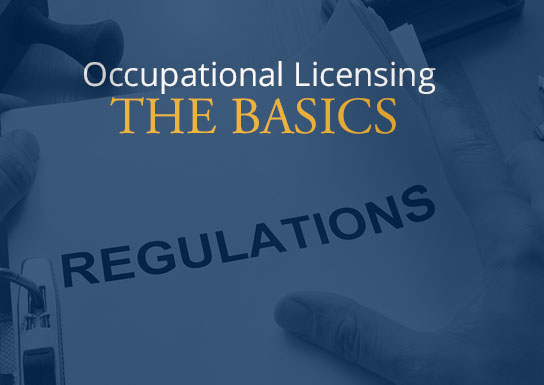What regulations affect your job? Find out here!
Your Job, and How It's Regulated
Our mission is to produce high-quality research on the effects of government regulation and to communicate the results broadly to inform real world change.
Use our Find Occupations page to select your State, Industry, and Occupation. It's that easy to learn what regulations and certifications affect your career field.
Established in 2016, The Knee Regulatory Research Center is an academic research center currently within the John Chambers College of Business and Economics at West Virginia University.

Is it time for occupational licensing reform? In the 1950s, about 5% of all occupations required some sort of licensing or certification. Today, over 1 in 5 U.S. workers (22%) are in a profession that requires a license!
Common sense tells us that jobs ranging from electricians and surgeons to architects and engineers should require some form of validation. The potential harm to be caused by an unqualified practitioner could be severe.
Unfortunately, in today’s environment licensing and other onerous regulations may apply to dance instructors and hair braiders, manicurists and interior designers. Being required to get a license to become a travel guide, for example, boggles the imagination.
Even in cases where most would agree certification is a good idea, the requirements of licensing are often both burdensome and aimed at protecting the market share of licensees, rather than addressing public health and safety concerns.
The uncontrolled growth of occupational regulations only harms consumers by increasing costs and workers by limiting employment options.

Knee Center is proud to introduce it's NEW affiliation with the Scope of Practice and Medical Licensure Research Group.
Scope of Practice and Medical Licensure Research Group is a scope of practice workshop made up of like-minded researchers from across the country.
Every month, they provide a virtual space for researchers from many types of departments- economics, law, nursing, psychology, pharmacy, public policy, sociology, to get together to present and discuss their manuscripts or policy briefs. They also organize sessions, panels, networking events, and conferences for scope of practice research.
Soon, all of the information shared by the group, will be available on our site! Until then, you can learn more about the group by clicking the box below.

Medical licensing laws, often enacted with the goal of improving healthcare for Americans, may contribute to increased costs and limited service options.
At the Knee Center, our goal is to research and catalog occupational regulations that affect the healthcare industry, but more importantly to understand the impact of these regulations on the costs and effectiveness of treatment. We believe that research can contribute to a regulatory environment with more healthcare choices, increased patient satisfaction, and better health outcomes.
From broadening the scope of practice for chiropractors to licensing pharmacists to prescribe certain medications, new views on occupational regulation hold the promise for a more vibrant and effective American healthcare system.

At the Knee Center, a big part of our commitment is to understand the effect that occupational regulation has on members and veterans of our armed forces.
Did you know that our military veterans, after serving their country, often move to civilian life with less of a chance of getting a job than the average American. One reason is unaddressed mental health issues a veteran may have after combat.
Additionally, studies show that veterans are less likely to highlight their individual skills, something employers may be looking for, and focus on their group participation and successes.
A priority at CSOR is to seek a better understanding of the challenges veterans face as they return to civilian life.

According to the Bureau of Justice Statistics, as many as 100 million U.S. citizens have a criminal record.
Those who are friends, family, or neighbors of these individuals are well aware of the unique set of challenges that previously convicted persons face when seeking employment.
At the Knee Center, we recognize that returning to the work force is critical so that individuals with criminal records can rehabilitate themselves. Unfortunately, occupational licensing laws may forbid them from doing so.




